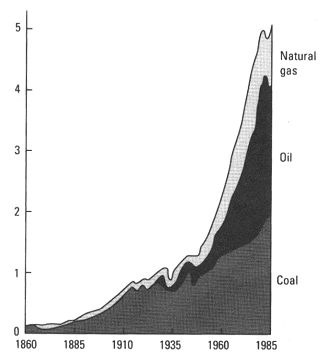| Finite Fossil Fuels - In Brief ? | |
|
The greatest area of public interest in finite resources is that associated with the fossil fuels, i.e. coal, oil, gases. Following the Arab - Israeli war in the 1970's the Arab nations placed an oil embargo on Israel's allies, the USA, and the price of a barrel of oil rose tenfold from 3 to 30$. The "oil crisis" as it was called rapidly made the USA and other countries aware of their extreme dependency and consumption. |
|
| Fuel Formation |
|
The coal, oil and gas we use today were formed millions of years ago. When the remains of vegetation degraded on the land and became buried under successive layers of debris coal was formed. When microscopic plants and animals settled on the seabed and were buried deeper by sediments like clay and sand as the years passed by gas and/or oil were formed. Sedimentary layers accumulated, and the increased pressure and temperature turned the organic matter into compounds of hydrogen and carbon. These hydrocarbons resulted in peat, bitumous coal and anthracite, or oil and gas which, under pressure, seeped through the pore spaces and fractures in the rocks. Some of the oil migrated upwards and reached the surface and where geological conditions were appropriate, oil was trapped underground - not as a "lake" but in the pores of the rock itself, known as a reservoir. A typical "trap has a cap of impermeable rock (rock which the oil cannot pass through) and the oil and or gas will remain in this "trap" until it is drilled for and brought to the surface |
|
Fuel Use
Fossil fuels are currently the primary sources of commercial energy used world wide and at present generating electricity using natural gas and coal is generally cheaper than competing technologies such as nuclear of solar power. It has been estimated that annually we use an amount of fossil fuel that it took nature 1 million years to produce. Whilst few people would deny that the consumption of fossil fuels will eventually lead to their exhaustion, how and when the various fuels will decline remains an issue for debate. Opinions vary but common figures quoted for an end to use are in the region of; 200 to 300 years for Coal reserves, 70 to 150 years for natural gas 50 to 90 years for oil |

Figure 1: World fossil fuel use 1860 - 1985 (in billion tonnes of oil equivalent) |